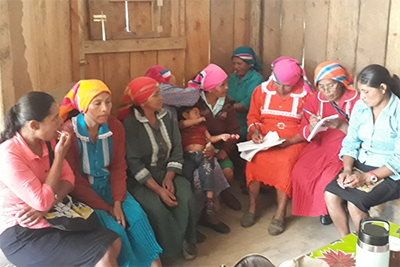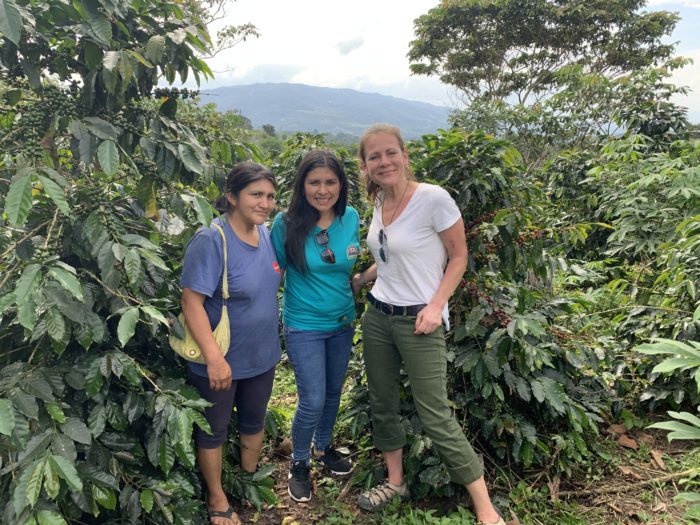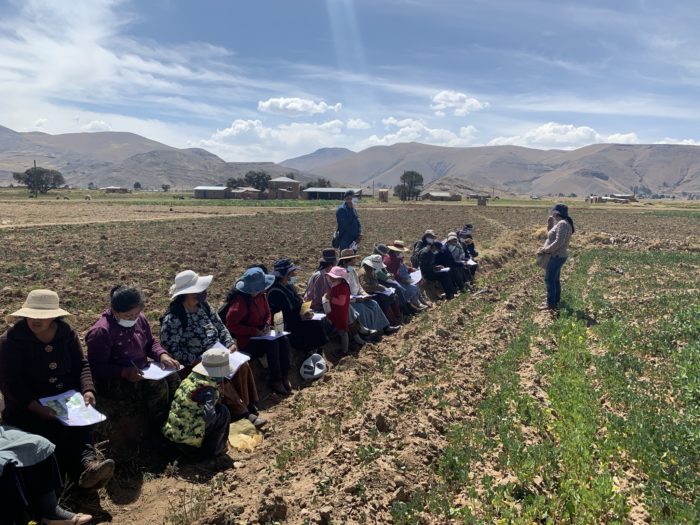During the month of March, the U.S. and the broader global community are coming together to celebrate the achievements of women. Monday, March 8, marked International Women’s Day, urging people everywhere to #ChooseToChallenge inequality, call out biases, question stereotypes and help forge an inclusive world. At NCBA CLUSA, we believe that promoting gender equality and women’s empowerment is essential to building prosperous households, communities, businesses and cooperatives. Through the USAID-funded Farmer-to-Farmer program, NCBA CLUSA seeks to promote gender equality and women’s empowerment through education and technical assistance. Check out some of the success stories below.
Honduras- AMIR

The Asociación de Mujeres Intibucanas Renovadas (AMIR) is a women’s organization with over 650 members founded in 1980. The main goal of AMIR is to advocate for indigenous women’s rights in Intibucá, Honduras. In its early years, AMIR worked to promote literacy, gender equity awareness and prevention of domestic violence against women, but has since expanded to include food processing and other business initiatives to improve the livelihoods of its members and their families.
AMIR, being a women’s association, has faced barriers to selling its products in formal markets, so it created a subsidiary company named Siguatas Lencas, which means young girl in its members’ indigenous language, in order to market AMIR’s products. However, the creation of Siguatas Lencas created confusion among AMIR’s members, and a clear separation of roles and responsibilities between the two entities became difficult to define, leading to operational inefficiencies.
NCBA CLUSA, through its USAID-funded Farmer-to-Farmer program, was able to connect volunteer James (Jim) Graham in March 2019 with AMIR. James is an experienced international development professional. He spent 3-weeks in Honduras assessing AMIR’s organizational development needs to identify innovations that could facilitate entrepreneurial activities, ensure the sustainability of the organization as it continues to grow, and promote economic empowerment among its members.
One of the main objectives of Jim’s assignment was to assist AMIR leaders and employees separate the activities of AMIR and Siguatas Lencas. Jim collaborated with the Board of Directors to establish an Annual Action Plan, which clarified the relationship between AMIR and Siguatas Lencas. This plan also included topics such as agricultural technical assistance, access to seed investment funds for production, improvement of productive processes, gender equity awareness and organizational strengthening. The overall aim of the plan was to improve efficiency in each organization so they can better promote women’s economic empowerment and achieve greater success as a business.
Peru- APROSELVANOR

NCBA CLUSA, in partnership with Solidaridad International, Technoserve, and Root Capital, supports APROSELVANOR to promote its growth in the coffee sector. The women-led association has already had some successes in the production and sale of green coffee since its establishment in 2015, and it has even secured a US-based client, called Sustainable Harvest, to whom it exported coffee in 2019. By years-end in 2020, its General Manager, Maricely Guevara Sanchez, hoped to widen the association’s market base globally, reduce its reliance on middlemen, and diversify its products to include roasted coffee.
In February 2020, returning Farmer-to-Farmer volunteer Mollie Moisan traveled to Peru to lend her time and expertise to assist APROSELVANOR on their marketing strategy. Mollie helped APROSELVANOR to bolster its online presence by creating two Instagram accounts with tailored content for potential international and regional buyers (Instagram handles @aproselvanor and @cafe8valles, respectively). Together, Mollie and APROSELVANOR also established a dedicated team for the sale and delivery of roasted coffee domestically, as well as developed an export strategy that included training Maricely to pitch her product to industry professionals at the Specialty Coffee Expo in Portland, which she had planned to attend. While the Expo was canceled in 2020 due to health and safety concerns related to COVID-19, Maricely remains optimistic about her ability to connect to buyers through Mollie’s professional network, as well as through the association’s revamped social media pages.
Peru- ASPROVAC

ASPROVAC is a farmer’s association made up of 46 quinoa producers located in the Puno region of Peru. The farmers mainly grow organic quinoa and potatoes, but they also raise dairy cattle for milk, cheese, and meat production. The farmers produce organic quinoa and pool their harvests together to deliver to OLAM, their main customer, which then processes the quinoa and exports it to Europe.
Global competition is a challenge for the organization. Spain, France and others now produce quinoa, leading to lowered quinoa prices and additional pressure on farmers to obtain certifications, such as organic. ASPROVAC sought technical assistance through the USAID-funded Farmer-to-Farmer program to learn more about biological pest control for organic farming. NCBA CLUSA connected ASPROVAC with volunteers Ada Martinez Ayala and Angela Rovnyak in November 2020. Ada has 14 years of work experience with the National Agrarian Health Service carrying out activities in Integrated Pest Management and Biological Control. Angela has a Master’s degree in Entomology and has worked in food science since 2016.
The assignment was conducted with a lot of enthusiasm from the farmers. There was a great interest among women producers, especially. Women are mostly in charge of conducting the farm but are also the ones with less time to attend trainings. During this assignment, there was high participation from women because the volunteer was a woman, which put them at greater ease to ask questions and share their ideas throughout the assignment. In addition, Ada speaks both Spanish and Quechua, the native language of most of the producers, so she was able to explain and clarify all their questions. The association hopes to take all the knowledge they learned from Ada and Angela to improve their organic farming methods in order to minimize plagues and illnesses.
Ecuador- Red de Asociaciones Cacaoteras de la Chakra Amazónica de Napo

Red de Asociaciones Cacaoteras de la Chakra Amazónica de Napo is a second-tier organization made up of cacao producer associations in the village of Napo in Ecuador. The organization’s main vision is to form an integrated network of producers to represent, defend, promote, and lead cacao production on the national and international markets. Chakra is a Kichwa term used in the Ecuadorian Amazon to describe an ancestral sustainable agroecological production method, which is at the core of their farming practices.
Among some of the Red de Asociaciones Cacaoteras’ member associations, women are part of the Board of Directors. Many women are in charge of decision-making, and the organization is actively working towards empowering its women members to take on more leadership. In Tsatsayaku (one of the member associations), a women’s group has been formed to lead new business initiatives.
In February 2021, NCBA CLUSA, through its USAID-funded Farmer-to-Farmer program, connected volunteers Emilio Salas Pastor and Ionnie McNeill with Red de Asociaciones Cacaoteras. Emilio and Ionnie completed a financial management training assignment in collaboration with the organization’s leaders. During the assignment, they analyzed standard financial management practices currently used by the member associations and provided trainings on basic accounting, budget, cash flow, forecasting etc. Of the 41 individuals who participated in the assignment, 29 were women, of which 16 are considered youth.
Following the assignment, training participants hope to share their new financial knowledge with the community, their families, and other association members. Participants learned about income statements, balance sheets, cash flow, and more. These topics are particularly important tools because they will empower participants to better control the accounting of their own businesses and establish good financial strategies for the future. Of the assignment, Lidia Marlene Grefa Chimbo, Fair Trade Coordinator and training participant, says, “Financial management trainers have taught me a lot. I have learned to do an accounting chart. I have my own business and am in a fair-trade audit process, so I have to take on the accounting. Now with this training, I will have a clearer idea of what to do.”
—
Are you interested in volunteering with Farmer-to-Farmer? Learn more about our open assignments in Ecuador and Peru here.


